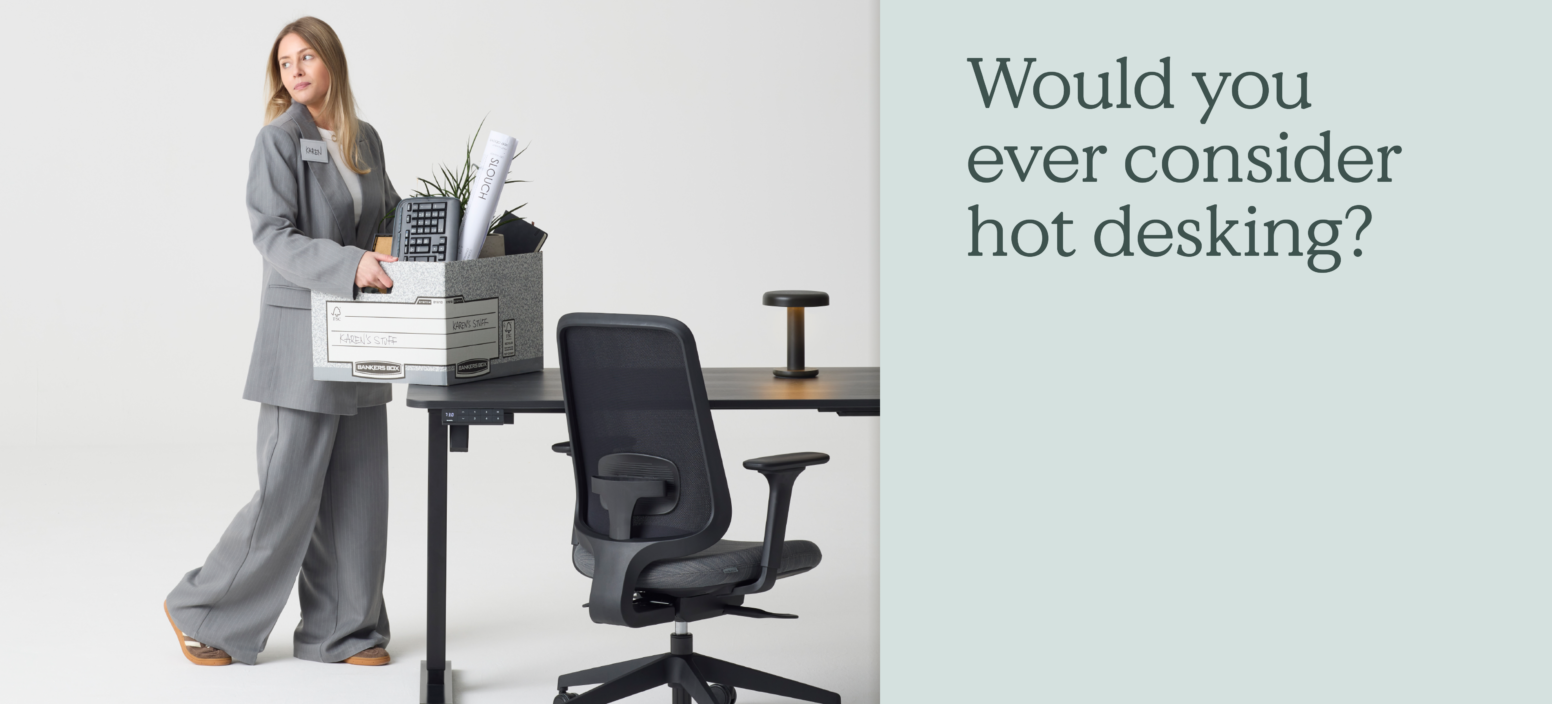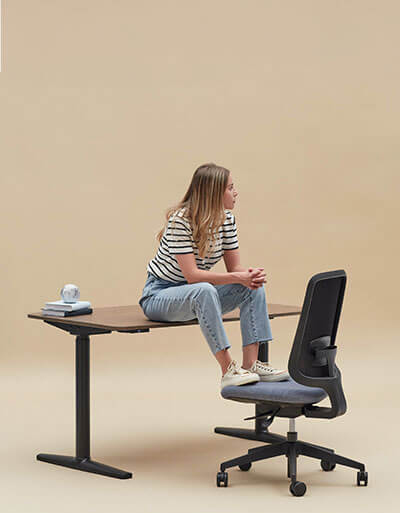As hybrid working becomes the new normal for offices, desk sharing is taking off in a big way. As the creators of thoughtfully designed ergonomic office desks, we’ve been taking note of this rising trend.
By creating a more flexible approach to desk usage, teams can reap a whole host of benefits you might not have considered. Keep reading to discover the ins and outs of why this system is gaining such popularity and how to institute it for your own office!
Just what is desk sharing?
In a nutshell, desk sharing (otherwise known as hot desking) means that no one has a permanently assigned desk space. This used to be the norm in offices for many years. However, the advent of hybrid working and different teams sharing the same spaces has made flexible desk sharing take off. It’s more efficient because it involves many people sharing a workspace at different times.
The key types of desk sharing
There are a few different desk sharing set-ups that you might encounter, depending on factors like your office layout.
Hot desking is both the most popular and the most free-flowing approach. Employees simply pick any available desk when they arrive. It’s first come, first serve.
Desk hoteling is where you book your desk for the day – usually with software. This can work well for large companies. For instance, you might need to be in a certain building or floor to access equipment or be near a certain team. Plus it takes away the stress of worrying if you’ll get a spot!
Team-based sharing keeps things a bit more structured by allocating specific zones or banks of desks to certain departments or teams. This can offer a good balance of structure and flexibility.
The big benefits of desk sharing
There are lots of reasons why modern businesses are embracing desk sharing and why you might want to as well. Let’s explore the most compelling ones.
The space & money saved
It’s a simple fact that office space is an expensive resource. Even more so if your office is in a city centre or business district. Desk sharing is a brilliant way to bring down costs by reducing your office footprint.
By using all available office desks, you might be able to cut your footprint immediately by 20-30%, even more so if you can stagger which days staff are in for an even flow. This could mean less square footage required plus lower rent and utilities.
Plus, you’ll be doing the planet a favour by using less power – a great idea for being a more sustainable office!
Staff wellbeing
Desk sharing puts the choice back in the hands of your employees. They’ll be able to pick:
- The environment that suits their mood and task – for instance, a quiet corner for focused work or a collaborative hub for team projects
- A fresh perspective from being able to sit near different colleagues each day
- Less commuting stress when combined with hybrid working
After all, it might seem like a small change but it can make a big difference to how people experience the environment they work in.
Hot desking etiquette
You might be wondering how to behave when you don’t have an allotted desk. With a space that’s shared with more people comes a responsibility to keep it nicely kept. We’ve put together some hot desk etiquette tips, to make sure you’re being a respectful colleague.
1. Leave it as you found it
Nobody wants to start their workday by cleaning up someone else’s mess, so make it a habit to:
- Give the desk a quick wipe down before you leave
- Take all your rubbish with you
- Return any borrowed items to their proper home
- Adjust chair settings back to neutral positions
If in doubt, remember: leave it as you found it. Or better yet, how you’d want to find it.
2. Pack up properly
One of the biggest mindset shifts with desk sharing is embracing the temporary nature of your workspace. That means taking everything with you when you leave. Your office might have storage locker shelves or lockers, but if you don’t you’ll have to take it with you.
This could be a benefit, making you think twice before you print documents out or bring in bulky equipment, as you’ll have to take it home.
3. Be considerate
With desk space being used more efficiently, you might be in closer confines with your colleagues than you used to be. That means you’ll need to make sure you’re not impacting their ability to work and focus just as you’d want them to do for you.
Having good workplace etiquette might mean investing in a pair of headphones for music or taking loud or frequent calls in a private booth. Plus, leave the tuna sandwiches at home (or at least eat them in the office kitchen!).
How to make a desk sharing system work for you
It’s never easy making organisational change – there’s an unavoidable teething period as it’s rolled out. However, you can preempt any issues by following these tips to make desk sharing work for your company.
Consider if it meets your needs
Firstly, assess whether desk sharing is the right choice for your business. It could be that the people who work in your business really do need their own spaces. For example, if they have specialist equipment, that shouldn’t be moved around if you can help it. However, for lots of businesses, it’s the right decision.
These are the questions to ask yourself:
- How often are your current desks actually occupied? If there are regularly empty desks, you’re likely paying for wasted space
- What percentage of your workforce is hybrid or remote? The more flexible your staff’s schedules, the more sense desk sharing makes
- Do your employees need specialised equipment or setups? This might make desk sharing more challenging for certain roles
- Would your team culture benefit from more cross-department interaction? Desk sharing naturally encourages more diverse workplace connections
With a little bit of reflection, you’ll be able to make an informed decision for your business. Plus, you can always consult with staff – they might have insights you wouldn’t have thought of!
Invest in hard-wearing furniture
If your office space is being used more efficiently, your furniture will need to work harder because it’s being put to more intense use by more people. You need office furniture that easily adjusts to different body types and preferences as well as standing up to frequent use without looking tired.
Slouch’s ergonomic office design philosophy means our height-adjustable desks and multi-adjustable chairs allow many different people with different body types to find the most comfortable working position for them.
Plus, the scratch-resistant MFC worktops maintain their sleek appearance even through years of daily use by multiple people.
Create a clear policy
Don’t leave people in doubt when they adopt this new system. A clear set of guidelines for using office desks will clear up any confusion out of the gate. This should cover how to go about booking a desk (if you’ve opted for this method), which teams should sit together and any off-limits areas.
It’s also worth reminding people how desks should be left at the end of the day and where there’s any storage available for personal belongings.
Find storage solutions
If staff can’t leave anything at their desk, this might mean investing in extra communal storage. Lockers are also a popular solution for personal items.
If there are essential documents, these can’t live in the drawers of a desk any more so will need a dedicated filing cabinet.
On the bright side, this might also prompt staff to consider what they print out more carefully!
Institute booking technology
There are plenty of great desk sharing booking platforms available that will sync with your company calendar for a small monthly fee. These will allow employees to book their workstation on a daily basis and save a lot of stress.
It’s also a great way to book private rooms to ensure that you have a space to hold confidential meetings or call clients without being disturbed.
Overcoming common challenges of introducing desk sharing
Preempt common issues faced by employers transitioning to a communal desk approach.
“But I like having my own desk!”
If your team is reluctant to give up having dedicated desks, don’t dismiss them out of hand – hear them out. Some of this insecurity will simply come from change generally feeling uncomfortable.
If you involve staff in the planning process and clearly explain the benefits, you’re much more likely to foster a sense of ownership over the process rather than feeling like it’s being imposed on them.
Starting with a voluntary trial period can help people experience the benefits so it doesn’t feel as daunting.
“‘I can never find a desk when I need one!”
This is why a booking system with real-time availability is your friend. You’ll avoid there being a morning scramble for desks and help staff get to all of the equipment or teams they need. We’d recommend sticking with desks only being bookable on the day itself – otherwise, you’ll get people booking out desks for weeks in advance for arbitrary reasons, undermining the flexibility of this approach.
Over time, the data from your booking system should help you understand how your staff work and what to invest in, whether it’s more office desks, breakout spaces or specialist equipment.
“Where do I put all my stuff?”
Solving this challenge will likely have to involve some give and take. There’s a valid need for personal storage space if desk surfaces and drawers have been where staff keep personal items. This could mean dedicated cloak rooms and lockers and for work files and equipment storage units or drawers.
However, it’s fair to use transitioning to desk sharing as a point to assess how much stuff people really need. Having to clear a desk by the end of the day might mean less clutter and a more focus-friendly space.
“The office feels less personal now”
Without desk decorations and personal bric-a-brac, it is possible that the workplace might feel more sterile than it did before. While this might reduce visual clutter, creating a more minimal looking office, it could also make it feel a little more sterile.
Combat this by investing in thoughtful design elements that add personality to the entire space rather than individual desks, like potted plants and wall art.
Invest in desks that stand up to daily use
Ready to embrace a hot desking system? You’ll need robust desks that can really stand up to the task of being used heavily while also being comfortable to work at for a range of people with different body types.
Slouch’s ergonomic office chairs and height-adjustable desks are designed with flexibility in mind – perfect for environments where multiple people use the same workspace. With scratch-resistant MFC surfaces, they’ll also be super simple to wipe down between users.
Purchasing more than 5 desks at a time? Get in touch to find out about our exclusive trade discounts.

